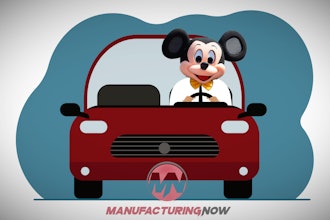By Mike Schmidt, Associate Editor, Manufacturing Business Technology
A full-scale assault on the human race doesn’t appear to be its end game, but I’ve still got my eye on Watson the supercomputer.
IBM’s trivia-minded creation has been in the headlines the past few weeks after it was announced it would take part in a three-day “Jeopardy!” tournament and try to match wits against two of the show’s most accomplished champions, Ken Jennings and Brad Rutter.
What transpired on the show was nothing short of a dominant performance by Watson. Over the course of the tournament, the supercomputer earned $77,147, versus $24,000 for Jennings and $21,600 for Brad Rutter. In the wake of his humbling defeat, Jennings seems to have come to grips with where he stands in comparison to the mighty, mighty Watson.
I followed this story with a rampant enthusiasm that bordered on obsession. As a fan (or fanatic, depending on how you define those words) of the Terminator movies, I couldn’t help but draw comparisons between Watson and Skynet, the Terminator antagonist and artificially intelligent computer system that becomes self-aware and revolts against its human creators. As I watched Watson run circles around Jennings and Rutter, the wide-eyed Terminator fan in me hoped it would be satisfied with its status as a “Jeopardy!” champion and won’t set its sights on greater accomplishments like, you know, global domination.
While I’m cautiously optimistic that we humans will not have to engage in a decades-long, post-apocalyptic war against power-hungry machines looking to wipe us off the face of the earth, I cannot help but wonder what the future holds for Watson and artificially intelligent computers like it.
Thankfully, a recent AP article shed some light on that very topic. I took particular notice of two very unique perspectives highlighted in the piece, which was written by AP writers Jordan Robertson and Seth Borenstein:
- Richard Doherty, a computer industry expert and research director at the Envisioneering Group in Seaford, N.Y., called Watson “the most significant breakthrough of this century” and the biggest technological breakthrough since the Internet.
- Paul Saffo, a longtime Silicon Valley forecaster, pointed out that better search engines are one future benefit we’ll likely see resulting from the creation of the "Jeopardy!"-playing machine, which took 25 IBM scientists four years to create. "We are headed toward a world where you are going to have a conversation with a machine," Saffo said. "Within five to 10 years, we'll look back and roll our eyes at the idea that search (engine) queries were a string of answers and not conversations."
In the article, the writers indicate that the consensus among experts is that scientists are nowhere near able to create machines that are capable of human thinking.
If one thing is for certain, it’s that technology is advancing at an ever-increasing rate of speed, and it doesn’t appear as if progress will slow down in the near future. As manufacturers look to invest in more efficient ways of doing business in the post-recession marketplace, the pressure will be on providers to develop faster, better, and more unique product offerings. Right now, cloud computing, mobile technology, and social media/analytics are the hot trends. One day, it may be artificial intelligence.
In the meantime, let’s just hope Watson doesn’t have a self-aware brother named Skynet.
Where do you stand on Watson and the future of artificial intelligence? Email me at [email protected]






















